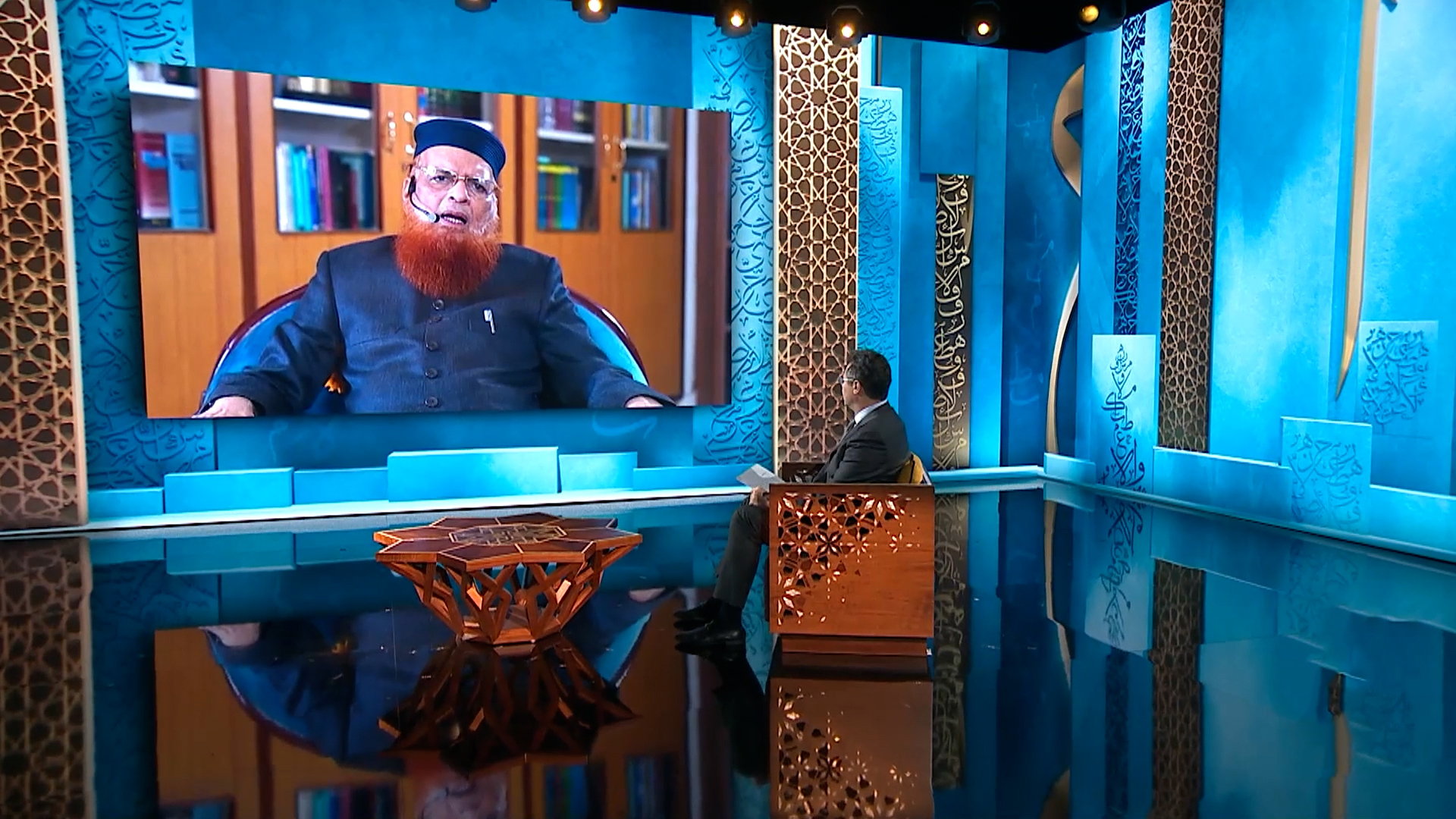play videoplay video
Video duration: 51 minutes 16 seconds 51:16
Dr. Muhammad Taqi Al-Othmani, President of Dar Al-Ulum University in Pakistan, said that when Islam entered the Indian Peninsula, it did not enter through war or preaching groups, but rather through Arab merchants who came to trade.
In today's episode, Tuesday (4/2/2024) of the "Sharia and Life in Ramadan" program, Al-Othmani discussed the history of the entry of Islam into the Indian peninsula, the role of Indian scholars in calling for Islam and preserving Islamic sciences, and the interest of Muslims in Pakistan and India in various Muslim issues.
Dr. Al-Othmani spoke about the history of the Indian subcontinent, which now contains the countries of Pakistan, India, and Bangladesh, and how it was previously divided into two parts, the north, known as Sindh, and the south, which was known as India, and its citizens worshiped idols and had different sects and paths in that.
He mentioned that Islam initially entered the southern region, which was called India, where some Arab Muslim merchants came to work and earn a living. They did not arrive as part of a military campaign or a preaching group, but their good morals, pure conduct, and good dealings prompted the people of the land to incline to the religion of Islam and ask about it. Then Get into it.
After that, Islam moved in the same way to the island of Sri Lanka, which was then called Serendip, where some Arab merchants lived and its people were influenced by them and converted to Islam, according to the words of the President of Dar Al Uloom University in Pakistan.
He added that while some Arabs were returning to their country across the sea, the king of Sindh attacked them. A Muslim woman wrote a letter to Al-Hajjaj bin Yusuf Al-Thaqafi, who was the emir of Basra at the time. He sent the leader Muhammad bin Al-Qasim to them and they conquered Sindh, then Islam spread there, and after that came kings from Afghanistan and conquered India.
The role of merchants
But Dr. Al-Othmani confirms that the spread of the religion of Islam preceded this through the role of merchants, who treated non-Muslims in a brotherly manner, and then the sincere preaching and wisdom carried out by scholars after them, until Muslims became a third of the population in the total territory of India and Sindh.
Dr. Al-Othmani pointed to the influential role of scholars in confronting successive waves of colonialism on the Indian continent, starting with Dutch colonialism, then French colonialism, and finally British colonialism, which ruled the country with all brutality, tyranny, and tyranny, killed innocents, and crucified those who called for the liberation of the country.
The Pakistani scholar discussed the pioneering role of the Indian subcontinent in preserving the science of the Prophet’s hadith, after giving a historical overview of his movement between countries, where he moved from the Hijaz to the Levant, then Iraq, and then to Transoxiana (Bukhara and Samarkand), in which the six books, “The Mothers in Hadith science.
Then, when Russian colonialism invaded these countries, the science of hadith moved to the Indian countries, which did not know anything about hadith, but God appointed the scholars of this region to memorize and study hadith - according to Al-Uthmani - and among them was Sheikh Ali Al-Muttaqi, who wrote his famous book “The Method of Workers in the Sunnahs of Sayings and Actions.” ".
After that, Muhammad Tahir appeared, who wrote “Tadhkirat al-Mawdoo’at,” in which he collected the sayings of scholars and hadith scholars regarding the status or weakness of the hadith, then Sheikhs Abdul Haqq al-Dahlawi and Wali Allah al-Dahlawi, who appeared in an era when the hadith sciences in India had faded, so he worked to renew it in Region.
Dr. Al-Othmani pointed out that Wali Allah Al-Dahlawi traveled to Hijaz and studied under Sheikh Ibrahim Al-Kurdi, after which he returned with hadith sciences to India and was a reference at that time, in addition to the fact that the hadith sciences spread in Pakistan, Bangladesh and India, thanks to God for their spread, is due to him.
Preserving the knowledge of hadith
He also pointed out that Indian scholars explained the six hadith books in a clear and in-depth manner, including the explanation of Sahih al-Bukhari by Sheikh Muhammad Anwar, as well as the explanation of Sunan al-Tirmidhi by Sheikh Abdul Rahman al-Mubarakfuri, adding that when Sheikh Rashid Reda visited India, he expressed his admiration for the efforts of these scholars in spreading the sciences of hadith.
The President of Dar Al Uloom University in Pakistan highlighted the specificity of the reality in the country of India, which resulted in special diligence on various issues, especially during periods of foreign colonialism, including considering the country of India at that stage as a house of war and not a house of Islam.
He also discussed the distinguished efforts to Islamize statutory laws, and in this context, he referred to several of his writings in Arabic, English, and Urdu about the flexibility of Sharia provisions and the spaces that Islam left for codification according to temporal and spatial circumstances, provided that they do not violate the Sharia principles.
Dr. Muhammad Taqi Al-Othmani referred to his work on a blog that aims to collect everything that was narrated about the Messenger of God, may God bless him and grant him peace, in its various degrees (authentic, good, and weak), of which 18 volumes have appeared, and he is continuing to prepare it, as it is expected to reach 40 volumes.
Al-Othmani stressed that Muslims in the Indian subcontinent are always concerned with Muslim issues and the Palestinian issue in particular, and that scholars have an important role in that, pointing out that Muslims in Pakistan and India support their brothers in Gaza by collecting aid, because they consider the Palestinian issue their first issue.
Source: Al Jazeera

